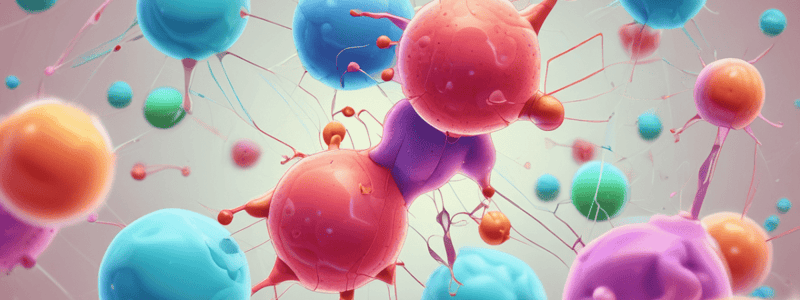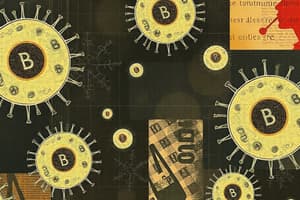Podcast
Questions and Answers
Which cells mediate the adaptive immune response?
Which cells mediate the adaptive immune response?
- Neutrophils
- Platelets
- B and T lymphocytes (correct)
- Red blood cells
What is the first principle of the clonal selection theory?
What is the first principle of the clonal selection theory?
- Lymphocytes proliferate clonally and differentiate into effector cells.
- Lymphocytes bearing self receptors are deleted early in development.
- Interaction between foreign antigen and lymphocyte receptor leads to lymphocyte activation.
- Each lymphocyte bears a single type of receptor of unique specificity. (correct)
What happens when lymphocytes recognize an antigen in the absence of co-stimulation?
What happens when lymphocytes recognize an antigen in the absence of co-stimulation?
- They undergo apoptosis.
- They differentiate into multiple cell types.
- They become 'anergic'. (correct)
- They rapidly proliferate.
Where are naive lymphocytes found?
Where are naive lymphocytes found?
Through which venules do naive lymphocytes migrate from blood to lymph nodes?
Through which venules do naive lymphocytes migrate from blood to lymph nodes?
Which cells are absent from the repertoire of mature lymphocytes?
Which cells are absent from the repertoire of mature lymphocytes?
What is the result of antigen recognition and clonal expansion by lymphocytes?
What is the result of antigen recognition and clonal expansion by lymphocytes?
Where are activated lymphocytes reported to proliferate and differentiate?
Where are activated lymphocytes reported to proliferate and differentiate?
What is the main function of B lymphocytes?
What is the main function of B lymphocytes?
Which type of cell do B lymphocytes form when activated?
Which type of cell do B lymphocytes form when activated?
Which region of the antibody determines its function?
Which region of the antibody determines its function?
How many antigen-binding sites are present on an antibody molecule?
How many antigen-binding sites are present on an antibody molecule?
Which class of antibody is the most abundant in serum?
Which class of antibody is the most abundant in serum?
Which function is associated with IgE?
Which function is associated with IgE?
Which type of antibody is present on mucosal surfaces and in serum?
Which type of antibody is present on mucosal surfaces and in serum?
What is a major role of plasma cells?
What is a major role of plasma cells?
Flashcards are hidden until you start studying
Study Notes
B Lymphocytes
- Recognize pathogens (antigens) via the B cell receptor (surface antibody, sIg)
- Produce antibody and mediate the humoral arm of adaptive response
- Reside in lymphatic tissues
B Cell Activation
- When activated, B cells divide and form plasma cells or memory cells
- Plasma cells produce large quantities of antibody and are long lived
Antibody Molecules
- Y-shaped molecules composed of 4 x polypeptide chains
- Comprise variable and constant regions
- Have 2 antigen-binding sites on variable regions
- Constant region determines the function of the antibody
Antibody Functions
- Activate complement proteins
- Coat (opsonise) microbes
- Neutralise viruses
- Neutralise toxins
Classes of Antibody
- IgG: neutralises antigens, activates complement, opsonin (mediates phagocytosis), crosses placenta, most abundant antibody in serum, in interstitial fluid
- IgM: neutralising antibody, agglutinates antigens, activates complement, in serum and on mucosal surfaces
- IgA: neutralising antibody, main antibody in external secretions
- IgE: activates mast cells, eosinophils and basophils, mediates anti-parasitic response, mediates allergic reactions
- IgD: function unclear, B cell receptor
Adaptive Immune Response
- Mediated by B and T lymphocytes
- Clonal Selection Theory: four principles
- Each lymphocyte bears a single type of receptor of unique specificity
- Interaction between foreign antigen and lymphocyte receptor leads to lymphocyte activation
- Activated lymphocytes proliferate clonally and differentiate into effector cells
- Lymphocytes bearing receptors specific for self molecules are deleted at an early stage in lymphoid cell development
Lymphocyte Activation
- Comprises recognition of antigen via lymphocyte receptors, co-stimulation, and clonal proliferation of activated cells
- Results in the generation of numerous identical effector cells
- Lymphocytes recognising antigen in the absence of co-stimulation become "anergic"
Lymphocyte Movements
- Found in BM, thymus, spleen, lymph nodes, MALT
- Naive lymphocytes migrate from blood to lymph nodes and lymphatic tissue via high endothelial venules (HEVs)
- Return to the blood via efferent lymphatics which drain into left subclavian vein via left thoracic duct
- Following recognition of antigen and clonal expansion, effector lymphocytes leave lymphatics and migrate to sites of injury
Studying That Suits You
Use AI to generate personalized quizzes and flashcards to suit your learning preferences.




